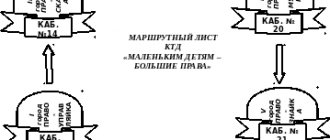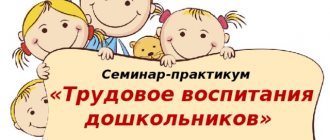Have you ever thought about what society should give to a child? Let us give examples of the guarantees that any preschooler attending kindergarten has. From birth to adulthood, children have their own individual “privileges.” All the rights of a child (any father or mother should know them briefly) are set out in the UN Convention.
Parents' responsibilities include strict monitoring to ensure that no one disturbs them while visiting kindergarten. If we analyze reality, then in practice the rights of the child in kindergarten are violated, but none of the violators receive the deserved punishment, because children do not always complain to their parents about their teachers.
What is the Convention?
This document was adopted by the UN, and it is far from the only normative act that touches on the topic of “Children’s Rights”. European countries pay significant attention to the problem of protecting preschool children, realizing that at this age they are unable to stand up for themselves on their own. Any civilized state has its own regulatory documents that list the rights of the child (in kindergarten, in particular).
The right to games and proper rest within the preschool educational institution
In kindergartens, lessons are often held on the development of fine motor skills, where children do something with their own hands, and in other classes they learn letters, but a change in developmental activities and games is mandatory. In the process of games, kids also learn and prepare for adult life, acting out various situations and episodes of the life of adults.
There are federal educational standards that determine leisure options for children in kindergarten. At the same time, the teacher is not a person who simply observes - he implements and accompanies new games that develop children and at the same time allow them to relax.
“Studying” the phone or idle conversations with other staff shows the teacher as an employee indifferent to his duties. It often happens that in groups a TV is installed and children watch cartoons all day long. Of course, the teacher in this way relieves himself of the burden, but he also violates the preschooler’s rights to full-fledged active games.
For rest, the child should be provided with his own crib where he will sleep. This should be a comfortable place for him.
What documents regulate guarantees in the Russian Federation?
In our country there is a Family Code, in addition, there is a Law “On Basic Guarantees of the Rights of the Child in the Russian Federation”. These documents are fundamental for social workers who monitor the well-being of families. The rights of a child in a preschool educational institution are protected by the Law “On Education”. There are also administrative documents and instructions in which they are also spelled out. Such regulations stipulate all the rights of a child in a preschool educational institution; parents should carefully read them and, if necessary, protect their children based on these laws.
Consultation for parents » Children's rights»consultation
Consultation for parents "Child's Rights".
Documents regulating the Rights of the child:
— Declaration of the Rights of the Child;
— UN Convention on the Rights of the Child;
— World Declaration on the Survival, Protection and Development of Children.
In our country, in addition to these documents, a number of legislative acts have been adopted:
— Family Code of the Russian Federation;
— Law “On Basic Guarantees of the Rights of the Child in the Russian Federation”;
- Education Act".
The listed documents proclaim the basic rights of children: to a name, citizenship, love, understanding, material security, social protection and the opportunity to receive an education, develop physically, mentally, morally and spiritually in conditions of freedom. A special place is given to protecting the rights of the child. It is stated that the child must receive timely assistance and be protected from all forms of neglect, cruelty and exploitation.
Legislative acts recognize every child - regardless of race, skin color, gender, language, religion, political or other beliefs, national, ethnic and social origin - the legal right to education, development, protection, active participation in the life of society. The rights of the child are linked to the rights and responsibilities of parents and other persons responsible for the lives of children, their development and protection.
Art. 65 clause 1 of the Family Code states that “parental rights cannot be exercised in conflict with the interests of the children. Ensuring the interests of children. Ensuring the interests of children should be the main concern of their parents. When exercising parental rights, adults do not have the right to harm the physical and mental health of children or their moral development. Methods of raising children must exclude neglectful, cruel, rude, degrading, treatment, insult or exploitation of children.
Every child, in accordance with the norms of domestic and international law, has the following rights and freedoms in the field of family relations:
- live and be raised in a family;
- know who his parents are;
- to live together with them (except when this is contrary to his interests) and to be cared for by them;
- to be raised by parents, and in their absence or deprivation of parental rights - to be raised by a guardian, trustee or child care institution;
— for comprehensive development;
- respect for human dignity;
- to communicate with parents, grandparents, brothers, sisters, and other relatives; This right is also reserved for a child in an extreme situation, that is, in a pre-trial detention center, hospital, etc.;
- for protection;
- to express one’s own opinion;
- to receive a surname, name, patronymic;
- to obtain funds, subsistence and own income.
Tips for parents:
- The child is not to blame for anything. Not that he was born. Not that it created additional difficulties for you. Not that it didn't meet your expectations. And you have no right to demand that he solve your problems.
- A child is not your property, but an independent person. And you have no right to decide his fate, much less ruin his life at your own discretion. You can only help him choose a path in life by studying his abilities and interests and creating conditions for their implementation.
— Your child will not always be obedient and sweet. His stubbornness and whims are as inevitable as the very fact of his presence in the family.
“You yourself are to blame for many of the child’s whims and pranks.” Because they didn’t understand him in time. They spared their time and energy. They began to perceive it through the prism of unfulfilled hopes and simply irritation. They demanded from him what he simply could not give you - due to his age or character, i.e. they didn’t want to accept him as he was.
- You must always believe in the best that is in the child. To the best that will still be in it. Do not doubt that sooner or later this best will certainly manifest itself. And remain optimistic in all pedagogical adversities.
The child learns what life teaches him
(Barbara L. Wolf)
If a child lives in an atmosphere of love and acceptance, he learns to find love.
If a child is treated with hostility, he learns to fight.
If a child is ridiculed, he learns to be shy.
If a child is shamed, he learns to feel guilty.
If a child is forced to show tolerance, he learns patience.
If a child is encouraged, he learns self-confidence.
If a child is praised, he learns gratitude.
If a child is treated fairly, he learns justice.
If a child grows up in safety, he learns to trust.
If a child is treated with approval, he learns to love himself.
Commandments of a wise parent
The child must be respected and seen as an individual; do not forget also that education is a “long-term” process; you cannot expect instant results. If for some reason your baby doesn’t live up to your expectations, don’t get angry. Calmly think about what you can do to make the situation change over time, do not try to make the child the best one.
It does not happen that a person knows and can do everything equally well. Even the oldest and wisest are incapable of this. Never say: “Masha is already reading at the age of 4, and you!” or “When I was your age, I did 20 push-ups on the horizontal bar, and you are just a mattress.” But your Vasya glues paper boats. Surely there is at least one thing that he does better than others. So praise him for what he knows and can do, and never scold him for what others can do!
Do not compare your child out loud to other children.
Take stories about the successes of other people's children as information. If the conversation that “Misha from the second entrance plays the violin unsurpassed” takes place in the presence of your child, you also need to say something in response. It is important that your child knows that you love him for who he is! Stop blackmailing your child. Eliminate the following phrases from the dictionary forever: “I tried, but you...,” “I got sick, and you...” Parents, in the language of the criminal code, this is called blackmail! The most dishonest of all attempts to shame, and it is also the most ineffective. Avoid witnesses! If a situation really arises that makes you blush (a child was rude to an old man, threw a tantrum in a store), you need to take him away from the scene. After that, calmly explain why this cannot be done. After all, self-esteem is not only inherent in adults, so it is very important that the conversation took place without witnesses. You need to talk firmly and decisively. Here it is quite appropriate to call the child to shame. The main thing is not to forget that there is a measure for everything.
What rights does a child have in the family?
Every born child has the following rights:
*live and be raised in a family, know your parents;
*to communicate with parents and other relatives when the child lives separately from the parents or one of them, as well as in cases where the parents live in different states;
*for family reunification (if necessary, the child has the right to obtain permission to enter and exit the country);
*to receive maintenance from their parents and other family members; in this case, the funds due to the child in the form of alimony, pensions, benefits are placed at the disposal of the parents and spent by them on the maintenance, education and upbringing of the child;
* for care and education by parents and persons in their stead, as well as the state (in the event that the child is left without parental care);
*respect for dignity and protection from parental abuse.
Getting ready for kindergarten
Russian reality is such that enrollment in a kindergarten often begins immediately after the baby is born, but a child can only enter the institution after reaching the age of three. The reason was the increase in the birth rate, as well as the closure of many preschool educational institutions during the destruction of the USSR. To solve the problem associated with the lack of space, new gardens are being built these days, but it is not yet expected to be completely eliminated.
To protect the fundamental right of a child in kindergarten, namely the child’s ability to attend this institution, the law established the obligation of authorities to provide children with a vacant place to receive preschool education. As soon as it’s your baby’s turn to decide on a deployment, various problems arise in the family. First of all, this is due to the fact that the child is waiting for a new stage in his life, he has anxious feelings, because it is not clear what exactly will happen in a new place, where there will be no father or mother next to him. The feelings of parents who expect their child to enter a preschool institution are much brighter. They feel concern, sadness, some fear, and excitement for their future “student.”
One of the serious issues that should not fall out of the sight of parents is the rights of the child in kindergarten. Not all modern mothers and fathers have a complete understanding of them. Although ignorance sometimes gives rise to very serious mental problems, which are very difficult to correct even after a few years. The content of the child’s rights is a problem that not every father or mother thinks about, while educators can take full advantage of it.
Examples of violation of rights in preschool educational institutions
There are several fairly typical situations of violation of a child’s rights when entering kindergarten. For example:
- The preschool educational institution denies the child the opportunity to take a vacant place due to the lack of necessary vaccinations . Parents have the right to make independent decisions regarding the health of their child, in particular, his vaccination;
- The preschool educational institution refuses admission to the child due to lack of registration at the place of residence . A child can enter kindergarten even on the basis of a rental agreement for an apartment in the area of the preschool educational institution. They do not have the right to deny him the opportunity to attend a child care facility.
We also note possible situations of violation of rights in preschool educational institutions:
- A teacher's rude, violent attitude towards a child, as well as sarcasm or shouting in his direction, is one of the most important violations of the rights of a small citizen. The teacher must be prepared for different behavior of the child, must be prepared and have the desire to work with such a child;
- insufficient garden equipment or non-compliance of food with state standards . The kindergarten must provide items that the child will need to meet his everyday needs. The premises must be clean and safe;
- The teacher's indifference to children is unacceptable . Children must be supervised both during the walk and in the group of the child care facility.
What is guaranteed for preschoolers?
We list the basic rights of a child in kindergarten for parents so that they can protect their children (if necessary). So, this is the right of the child:
- To obtain an education, as well as to form and develop creative and physical abilities. Any preschool institution is obliged to provide additional educational activities for children. In addition to walks in the fresh air, games, the baby should be promoted in the direction of mental development. To achieve the goal, teachers working in kindergartens help children improve, gradually complicating the tasks they solve (even if at first glance they seem quite simple for adults). In the absence of developmental activities, there is reason to claim that the guarantee is violated. In our country there is a large-scale network of preschool educational institutions operating around the clock or during the daytime. Educational programs for preschoolers are being updated, and special Federal State Standards have been introduced to regulate the development of children in kindergartens.
- To the game. Based on the development of the baby’s intellectual and creative abilities, one must also remember that play is important for a child. It is here that he acquires communication skills, so educators should pay special attention to variety, which children will not get bored with.
- For health and life. Perhaps these are the basic rights of a child in kindergarten (for parents, these rights are the most important), because if they are not respected, the child’s life may be in serious danger. The Law “On Education” states that a preschool educational institution is obliged to guarantee the life and health of its students. If necessary, the baby must be provided with medical care, therefore, those child care institutions that do not have a medical office violate the guarantee of medical care, and therefore must be closed.
- For protection from abuse. Teachers can often shout at, or even worse, hit children. This is completely unacceptable and must be stopped by both parents and the kindergarten administration.
- To protect the needs and interests of the child. Children must be given due attention; toys and basic hygiene products must comply with all standards.
- For quality food. The baby's body needs a sufficient, high-quality, complete flow of food throughout the day. If children are given products that have expired, the child's rights are violated, and parents can file a complaint with the prosecutor's office.
The child’s right to creative development
According to the Russian Law “On Education”, any child can apply for an individual approach in kindergarten, as well as the identification of his talents and their development. To do this, educators are required to carry out creative activities (drawing, modeling), which cannot be monotonous, and there must also be no discrimination based on the level of ability on the part of the teacher.
Important! The lack of developmental creative activities is a direct violation of the rights of a preschool child.
What is child abuse?
The definition of “abuse” includes beatings, sexual, emotional or physical violence (for example, yelling, insults, humiliation). In kindergartens, violations of this kind occur quite often, and teachers consider it normal to shout at children, call them ugly names, and slap them in the face. If you find out that a child’s rights are being violated (examples of such situations are common), that is, some kind of violence was used against the child, transfer him to another preschool institution.
Until what age is a child considered such?
A child is considered a person who has not reached the age of majority (eighteen years of age). But there are also exceptions. The first case is if a 16-year-old teenager, with the consent of his parents (guardian, adoptive parent), gets a job, signs a contract or employment agreement, and engages in volunteering.
As an option, a 16-year-old teenager begins to engage in entrepreneurial activity, then he can already be declared legally competent. Another case is marriage before adulthood. In this case, the teenager is considered legally competent from the day the marriage was concluded.
For information about what emancipation of minors is, see the following video.
Minors and minors
By law, children were divided into two categories - minors and minors. Depending on the category of children in the Russian Federation, whether they are minors or minors, children and their parents are provided for by law with various rights and freedoms. A child is considered a minor from birth to the age of fourteen.
At the age of 14, a teenager becomes a minor. The rights and freedoms of each child depend on which category he belongs to. So, until he turns 14 years old, all issues are resolved by his parents (guardians, adoptive parents).
At the age of 14, a person already has the right to independently make decisions about small transactions, and upon reaching adulthood, he acquires the rights of an adult, becomes fully capable and has all the civil rights and responsibilities of other citizens of the state.
According to the law of the Russian Federation, 14 years is the period for obtaining a passport.
Can parents protect children in preschool institutions?
It is parents who can and must ensure that the rights of their children in preschool educational institutions are not violated. When choosing a kindergarten, mothers and fathers are obliged to check the level of qualifications of the teachers to whom they will take their children. If, after the first visit to kindergarten, the baby is capricious at home, refuses to sleep, or cries for no reason, then a feeling of discomfort is obvious. Parents should closely monitor the baby; if after 3-4 days his behavior does not change, nervousness increases, talk to the teachers. If after the conversation nothing changes and the child refuses to go to kindergarten, look for another preschool institution for him.
Are there ways to find out about a violation of a child's rights?
Parents are the main defenders of their child's rights. They must know his rights and monitor their proper implementation. But this is not so easy to do; the child may come up with unnecessary circumstances or, conversely, out of fear, try to hide the unpleasant fact of the violation. The latter can be used by a careless teacher to continue his free treatment of the baby. But there are still some ways:
- a parent can talk confidentially with their child . If this does not help, play role-playing games where the child mirrors the teacher’s behavior;
- anxiety, restlessness, tearfulness and nervousness should alert any parent . The child may also refuse to go to kindergarten. It is necessary to find out the reason, perhaps even through a psychologist;
- Nowadays, parents of children from the same group often create a chat in instant messengers, where they can check with other parents about similar cases with their children in order to compare information. Before entering a particular kindergarten, you can communicate with parents in groups on social networks, collect feedback;
- parents have the right not only to come to the children's institution before admission and inspect the group, but also to ask for food certificates . The teacher does not have the right to refuse the parent this. However, if this happens, the parent can file a complaint with the head of the preschool educational institution.
How should parents behave if violations are detected?
First, you need to contact the head of the kindergarten in writing and ask him to stop unlawful actions on the part of the employees. If there are no positive results, file a complaint with the prosecutor's office. An internal investigation will be conducted in this institution, and parents who believe that the rights of their child were violated by employees of the preschool institution will be informed of its results.
The main task is to remember that a child of 2-3 years of age will not be able to stand up for himself. Of course, today many children at this age already know how to turn on the TV to watch cartoons or “rummage” through their father’s mobile phone. However, this does not mean that they will be able to repel an impolite teacher who tries to shout or hit. Try to ask your child more often about events in the garden. Very often he remembers the most vivid pleasant and unpleasant moments, so he can somehow tell you about them. After this, do not postpone active actions until later, so that the child does not receive mental trauma.
Children's rights: rules of dialogue with preschool employees
You need to talk to preschool employees correctly. Various kinds of excuses are possible on their part; find a worthy answer to them.
- The parent suggested an excursion to the museum, the teacher refuses to participate, citing fatigue.
- This is bad, preschool workers are not at all interested, do not listen to other people’s opinions, and do not want to satisfy the requests and desires of the children.
- The teacher puts the baby in a corner, citing a broken cup after breakfast.
- It is a bad thing for a teacher to punish a child for every mistake he makes. It would be better to remain silent and even encourage the child, because he is just learning to live; moral violence against children is unacceptable.
- The teacher gave the boy a slap on the head, supposedly for his work, because before they could have given him a hard time, which means that such upbringing is normal.
- The baby is not a powerless creature, he is the same full-fledged little citizen of our country. You need to show patience and respect, despite your seniority, the beating teacher is not a teacher, he should change his job.
- According to the child, the teacher taped his mouth, because today such punishment has become fashionable among teachers, it is quite acceptable and not punishable for a teacher.
- Parents should install cameras and know more about how their children behave and what they do. You cannot refer to the fact that the child fantasizes, can invent and tell lies. From an early age, a child feels everything, understands, if he is loved and treated well, he is unlikely to lie. There is more faith in him than in the teacher, but his actions and methods of education today are easy to check.
Observation
In order to draw conclusions about the work of the organization’s employees, you can casually visit a preschool educational institution during a walk or class. At the same time, it is worth taking a closer look at the behavior of teachers. If they behave aggressively and yell at children, then this behavior should not be ignored.
On the other hand, a teacher who looks away aloofly while children push each other is also a serious offense.
Based on all this data, conclusions can be drawn about the work of the educational institution. If they cannot cope with their responsibilities, then it is necessary to take active action.
Medical support
As for health protection, the rights of the child in the Constitution of the Russian Federation also contain clauses regarding health protection. They state that every minor has all rights and freedoms in the field of medical care. He can:
- Get treatment and observation at a dispensary.
- Take advantage of preferential conditions for food and medical care.
- Receive information about his/her health status in a form that, according to the protection of children's rights, is accessible to his/her age.
- Study and work in conditions that exclude the adverse effects of various factors on his health.
What is very important, the protection of children’s rights in the Russian Federation allows minors who have reached the age of 15 to voluntarily agree or refuse medical intervention in writing.
Healthcare costs in the Russian Federation.






